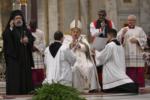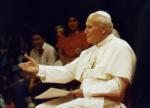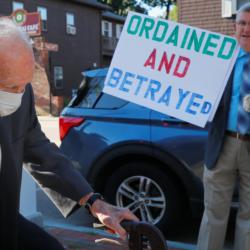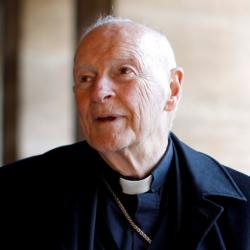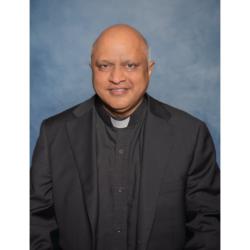St. Ambrose Day
I don't know why it was only this year that I noticed the significance in St. Ambrose's feast day, Dec. 7, falling between St. Nick's and the Immaculate Conception.
Maybe it's because, over time, my family has made an increasingly bigger deal of those other two feasts. We put shoes on the stairs for St. Nick's, bring out the creche, and put up our tree. For us, it marks a religious, not commercial, start to a celebration of Christmas in anticipation.
The Immaculate Conception is a great solemnity that Catholics are meant to treat with the special care they devote to a Sunday. (My university wisely cancels classes.) Many Catholics pray a novena leading up to it and celebrate it not less than any holiday.
Thus, the lull on the day between becomes more striking -- not quite taken up by greetings of "happy Pearl Harbor Day," which now lives on in infamy alone.
A priest recently gave this shrewd advice: "Treat Advent and shopping as leading to contemplation." Indeed, as we buy gifts, we are getting ready to bend the knee and adore, beside the manger.
Another priest, in a homily, observed how the Immaculate Conception presages the coming of the Savior. Our Lady's conception without sin, he said, prepared for the Virgin Birth, which is Christmas. And that she could come into existence spotlessly was effected by the same grace, applied retroactively, which was won for us sinners through the Passion.
But then, if these things are so, doesn't St. Ambrose's feast day, in marvelously spanning these other days, also help us to prepare for Christmas?
But how does his memorial span them? (Most Catholics, I think, know St. Ambrose only as the teacher of St. Augustine.) In two ways, at least: through his teaching on the cardinal virtues and on virginity.
It was St. Ambrose who introduced the language of "cardinal virtues" to the Christian tradition. Plato, Aristotle, and Cicero had all identified prudence, justice, courage, and moderation as chief virtues. Ambrose seems to have been the first to call them "cardinal."
He has a treatise on these virtues, modeled on Cicero. Cicero wrote "On Duties" ("De Officiis"), while Ambrose wrote "On Duties of Clerics" ("De Officiis Ministrorum"). In that work, he calls them "principal virtues."
But his proclivity to call them "cardinal" virtues shows up in his commentary on the Gospel of Luke. There, he puzzles as to why Matthew, in the Sermon on the Mount, gives eight beatitudes, while Luke, in the Sermon on the Plain, gives only four. Recall:
1. Blessed be you poor: for yours is the kingdom of God.
2. Blessed are you that hunger now: for you shall be filled.
3. Blessed are you that weep now: for you shall laugh.
4. Blessed are you, when men shall hate you, and when they shall separate you from their company, and shall reproach you, and cast out your name as evil, for the Son of man's sake.
Luke gives four, says Ambrose, because he wanted to map the Lord's blessings onto the four "cardinal" virtues. (He doesn't say how or in what order. Perhaps: prudence, moderation, justice, and courage.)
The link to Christmas would be this. The word "cardinal" literally means "hinge." Now, in the Christian tradition, these virtues are considered "hinge" virtues for two reasons. First, because all other good traits of character are regarded as depending or "hinging" on these. Second, because, taken together, these four virtues become akin to the "hinge" of a door, opening up to prayer and contemplation.
You see then how this teaching of St. Ambrose really does match the position of his feast day. Take St. Nicholas to represent gift-giving, the busyness of Christmas, and the active life. Take the Immaculate Conception, in contrast, to represent resting in the Lord and contemplation. It is by the cardinal or "hinge" virtues that a door is opened up, from one to the other.
Thus, St. Ambrose, in effect, tells us that the best way to prepare for Christmas is to live these virtues well: we should live this "minor penitential season" of Advent better by examining ourselves on how we live the cardinal virtues.
A second characteristic mark of Ambrose is his love of virginity, as the Catholic Encyclopedia explains (www.newadvent.org/cathen/01383c.htm):
"Every Sunday his eloquent discourses drew immense crowds to the Basilica. One favorite topic of his was the excellence of virginity, and so successful was he in persuading maidens to adopt the religious profession that many a mother refused to permit her daughters to listen to his words. The saint was forced to refute the charge that he was depopulating the empire by quaintly appealing to the young men as to whether any of them experienced any difficulty in finding wives. He contends, and the experience of ages sustains his contention (De Virg., vii) that the population increases in direct proportion to the esteem in which virginity is held."
Whether in St. Ambrose's teaching one finds a remedy for the declining population in the West, I'll leave to you. But in his remarkable discourse on virginity, he describes virginity as, through its love, going up to heaven and bringing back the Word with it: "Virginity has brought from heaven that which it may imitate on earth," he says, "Then a Virgin conceived, and the Word became flesh, that flesh might become God." Virginity caused Christmas.
- Michael Pakaluk, an Aristotle scholar and Ordinarius of the Pontifical Academy of St. Thomas Aquinas, is a professor in the Busch School of Business at the Catholic University of America. He lives in Hyattsville, MD, with his wife Catherine, also a professor at the Busch School, and their eight children. His latest book is "Mary's Voice in the Gospel of John" available from Amazon.





